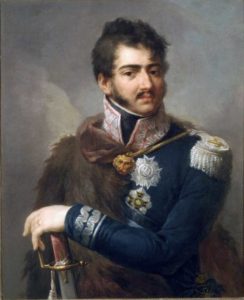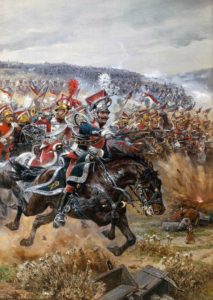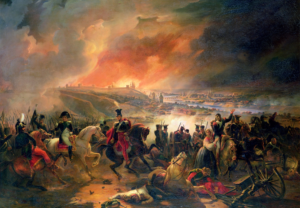He died on 19 October 1813 in the Battle of Leipzig – the decisive Battle of the Nations. The battle decided the fall of the First French Empire, and destroyed many hopes and dreams of reestablishing a sovereign Polish state in Europe. Józef Poniatowski, until the final days of his life, refused even the thought of capitulation and resigning from the struggle. He appealed to his soldiers not to “stain the national character” and “die the death of brave men” under any circumstances. The Battle of Leipzig is the origin of his legend as the Polish Bayard: “the knight without fear and beyond reproach.” But, was he indeed “greater than the king, this prince,” as stated in the title of one novel devoted to Józef Poniatowski (by the lawyer and writer Stanisław Szenic)?
by Piotr Bejrowski

Józef Poniatowski, nephew of the last king of Poland, Stanisław August Poniatowski, was born on 7 May 1763 in Vienna. There he spent the first twenty-five years of his life, until his uncle called for him to come to Poland. He became a general in the Polish army: he fought for the cause of the Constitution of 3 May and in the Kosciuszko Uprising. After the third partition of the Polish-Lithuanian Commonwealth and the collapse of the country, he withdrew from public life, focusing on social life. Ten years later, when the Napoleonic army entered Poland, the bon vivant chose to serve the homeland and took charge of the Polish army established alongside the French one.
On 21 May 1809, Poniatowski was appointed commander in chief of the Army of the Duchy of Warsaw. That same year, he distinguished himself in the war against Austria, during which he won a number of victories and triumphantly entered Kraków. He also took part in the Russian Campaign of 1812, which ended in disaster for Napoleon’s Grand Army. Despite pressure from the Russians, Prince Józef remained faithful to Bonaparte until the end. He led the corps he commanded into Saxony, where he took part in the Battle of Leipzig.
In the first day of fighting, on 16 October 1813, he was appointed a Marshal of the French Empire. Three days later, he drowned while trying to cross to the other shore of the Elster River (a long Central European river), when Polish forces had been cut off from the Napoleonic army. While searching for a possibility to ford the river, Poniatowski was wounded several times. Having escaped from enemy units, he entered the water, where he was struck by a bullet. Before dying, he said, with pathos in his voice: “God has entrusted me with the honor of the Poles. I will return it to Him alone.”

According to the prince’s biographer, Jerzy Skowronek, in the final hours of his life, the wounded commander “approached his death, having consciously chosen the best possible attitude, in his opinion, and the size and significance of the struggle at Leipzig gave it a special dimension.” He had chosen Poland and the alliance with France, which appeared to be the single real chance to rebuild the partitioned country. He never changed his mind.
The romantic legend of the prince, established by nineteenth-century poets and writers, also has its roots in historiography. One researcher who wrote about it was Szymon Askenazy, founder of the Lwów-Warsaw School of History, also known as the Askenazy School, which was first in underlining the importance of recent history in the creation of the modern Polish nation. The historian wrote about the “eternally young commander in chief,” characterized by “chivalrous panache and flair” and “a great embodiment of the national character.” The fourth edition of Askenazy’s popular biography, to “the memory of the leader in whom lived bravery, honor, conscience, humanity and immortal Poland,” was dedicated to the reborn army of the independent Second Republic of Poland. From the moment of his heroic death and subsequent burial in Wawel Cathedral (in 1817), the legend of Józef Poniatowski – the embodiment of chivalric tradition – became an integral part of the myth of the nation’s military.
In historiography, this positive image of the Polish Bayard prevails definitively. Askenazy’s successors have primarily emphasized his military and organizational talents. Poniatowski, nephew of the king, knew how to use his Austrian experience in creating a modern army for the Polish-Lithuanian Commonwealth. In the view of Stanisław Herbst, “with broad vision and intelligence he towered over honored colleagues” as a commander. Poniatowski was able to adapt to the post-revolutionary model of war and the tactics of the new French emperor. He never hesitated on the battlefield. Faced with crisis, he typically made effective decisions. He never once provoked to a tactical disaster, and succeeded in defeating stronger opponents.

Stefan Żeromski, the outstanding writer from the first decades of the twentieth century, was among the few prominent critics of this cult of the “national hero.” According to Żeromski, who valued Tadeusz Kościuszko much more highly and who criticized Polish commitments to the Napoleonic wars, Poniatowski, as Minister of War of the Duchy of Warsaw, was mainly driven by the “desire for fame” and lacked the “qualities of the heroes of the world.”
But was Poniatowski “greater than the king”? Surely he was. His merits in serving the homeland are great, thus he exceeded the achievements of his uncle, who reigned as Stanisław II Augustus and is regarded as one of the most controversial monarchs in the history of the Polish Republic. Poniatowski, thanks to his heroism and determination and his death on the battlefield, became a symbol for a young generation of Polish elites who had entrusted their fate to Napoleon and had shed blood fighting side by side with the French army. The emperor himself saw Poniatowski as “the true king of Poland.” The legend of “the greatest Uhlan among Uhlans” (the term for members of the Polish light cavalry) grew with each generation – which is not surprising, as in the dramatic times following the collapse of the state, people of great character would prove lacking. Commemorating Józef Poniatowski encouraged the nation.
Author: Piotr Bejrowski
Translation: Alicja Rose & Alan Lockwood





